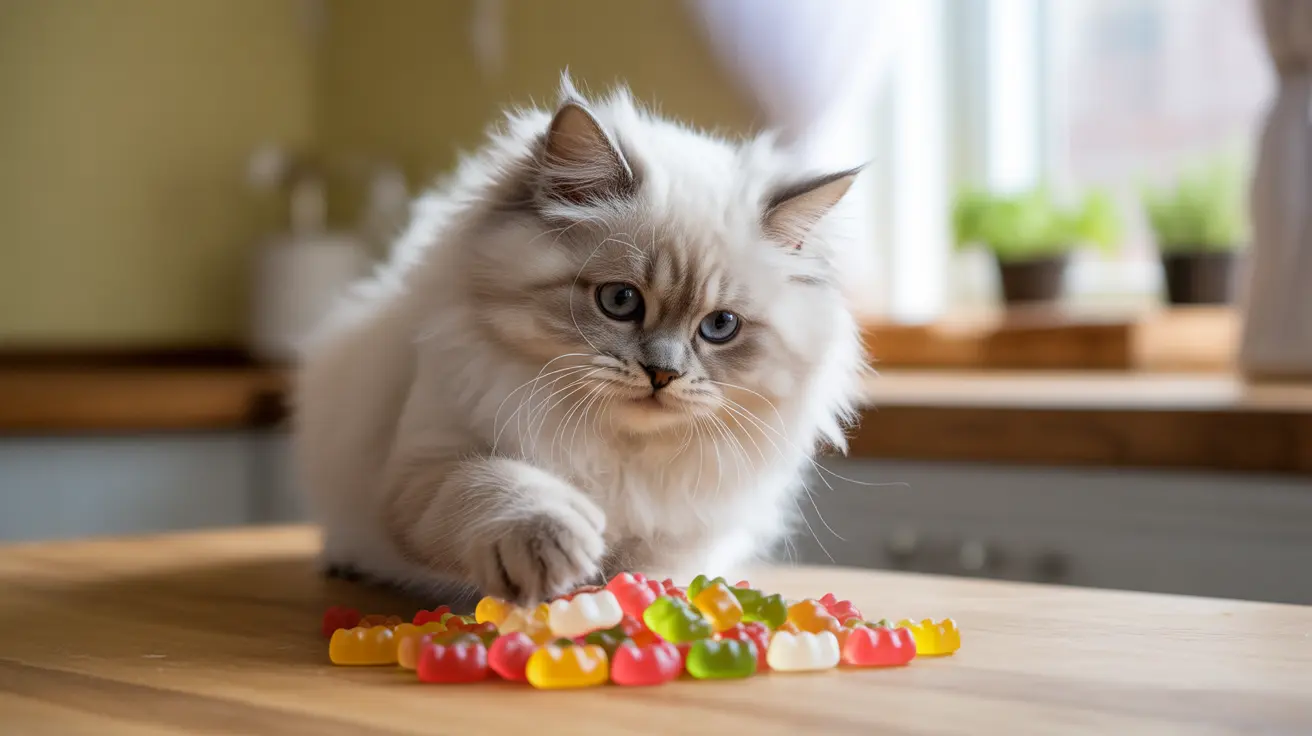The Dangers of Gummy Bears for Cats
Gummy bears present multiple hazards to cats, ranging from immediate physical risks to long-term health concerns. The chewy, sticky texture of these candies can create serious problems for your feline companion.
Immediate Physical Risks
The most immediate danger comes from the gummy bears' texture. These candies can easily become lodged in a cat's throat or digestive tract, potentially causing life-threatening blockages. Cats don't chew their food as thoroughly as humans do, making this risk even more significant.
Nutritional Concerns
Gummy bears offer zero nutritional value for cats. They consist primarily of sugar, artificial colors, and flavors - none of which contribute to feline health. In fact, these ingredients can actively harm your cat's wellbeing.
Health Complications from Gummy Bear Consumption
Digestive Issues
When cats consume gummy bears, they may experience severe digestive upset, including:
- Vomiting
- Diarrhea
- Abdominal pain
- Bloating
- Loss of appetite
Long-term Health Effects
Regular exposure to sugary treats like gummy bears can lead to serious health conditions:
- Obesity
- Diabetes
- Dental decay
- Chronic inflammation
- Digestive system disorders
The Sugar-Free Gummy Bear Threat
Sugar-free varieties of gummy bears often contain artificial sweeteners like xylitol. While xylitol's toxicity in cats isn't as well-documented as it is in dogs, veterinarians strongly advise against exposing cats to any artificial sweeteners due to potential unknown risks.
Safe Treat Alternatives for Cats
Instead of gummy bears, consider these cat-appropriate treats:
- Commercial cat treats formulated for feline nutrition
- Small pieces of cooked chicken or turkey
- Freeze-dried meat treats
- Cat-specific dental treats
What to Do If Your Cat Eats Gummy Bears
If your cat manages to consume gummy bears, monitor them closely for any adverse reactions. Contact your veterinarian immediately if you notice:
- Difficulty breathing
- Excessive drooling
- Signs of choking
- Severe lethargy
- Persistent vomiting or diarrhea
Frequently Asked Questions
Can cats safely eat gummy bears or is it harmful to their health?
No, cats cannot safely eat gummy bears. They are harmful to cats' health due to their high sugar content, artificial ingredients, and potential choking hazard. Cats lack the necessary enzymes to properly digest these sugary treats.
What are the risks of gummy bears causing choking or digestive problems in cats?
Gummy bears pose significant choking risks due to their sticky, chewy texture. They can become lodged in the throat or cause intestinal blockages. The dense, sugary composition can also lead to severe digestive upset.
Why do gummy bears have no nutritional value for cats and why should they avoid sugar?
Cats are obligate carnivores requiring meat-based nutrition. They lack sweet taste receptors and the digestive enzymes needed to process sugars properly. Gummy bears provide empty calories that can lead to obesity and other health issues.
Are sugar-free gummy bears with xylitol dangerous for cats?
While xylitol's toxicity in cats isn't as well-documented as in dogs, veterinarians recommend avoiding sugar-free gummy bears containing xylitol due to potential unknown risks and the overall inappropriateness of such treats for cats.
What symptoms should I watch for if my cat accidentally eats gummy bears?
Monitor your cat for symptoms such as vomiting, diarrhea, lethargy, difficulty breathing, excessive drooling, and signs of abdominal pain. If any of these symptoms occur, contact your veterinarian immediately.
Conclusion
While gummy bears might be a sweet treat for humans, they have no place in your cat's diet. The risks far outweigh any momentary pleasure your cat might derive from these candies. Focus instead on providing species-appropriate treats that support your cat's health and well-being.






